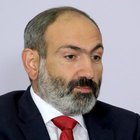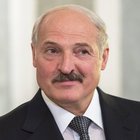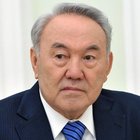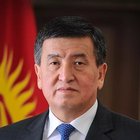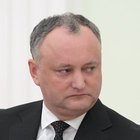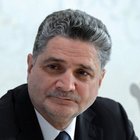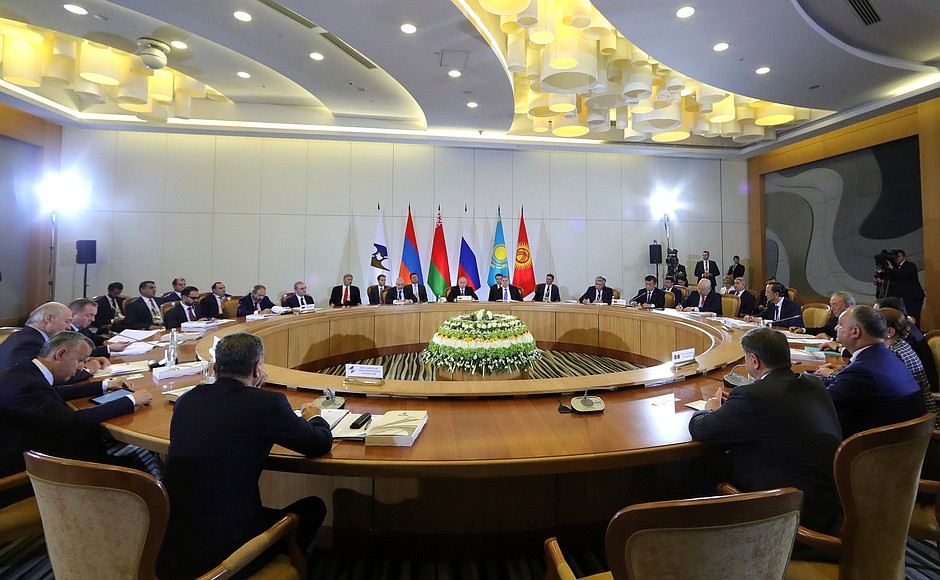
President of Russia Vladimir Putin: Colleagues,
We have just concluded the restricted format meeting of the Supreme Eurasian Economic Council, where we considered important aspects of the Union’s activity and reached a number of agreements. I will be straight, it was not without some discussion and argument, but we still managed to reach common decisions.
I would like to mention the decision on granting EAEU observer status to the Republic of Moldova. On that note, I would also like to welcome President of Moldova Igor Dodon who has joined our meeting. I hope that as an observer the Republic of Moldova will take an active part in the work of our integration association. We are ready to consider applications from other interested countries, primarily our CIS neighbours.
During our restricted format meeting, we discussed in detail other pressing issues of cooperation of the Five. As EAEU Chair, Russia voiced its considerations on integration work in 2018. One of the priority tasks is to make more effective the functioning of the common EAEU market and bring closer the national rules of economic regulation.
As before, primary attention will be paid to the removal of remaining restrictions and gaps in the way of the free movement of goods, capital and workforce. Our aim is to create the most comfortable conditions for business. One way of doing this is to work consistently with business circles and consider their wishes.
Good opportunities for expanding cooperation are opening up in nuclear energy, renewable energy, environmental protection, medicine and space. In these advanced industries, it is important to expand production cooperation, jointly work on new technologies and know-how, and introduce innovations that meet global economic and technological standards.
Implementation of the EAEU digital agenda is another priority. Under the Russian chairmanship, we propose to carry out several promising projects in online trade, goods tracking technology, creating transport corridors and industrial cooperation. A forum on these issues has been held quite recently at the initiative of Kazakhstan’s president. We give our full support to this and we will work together. Naturally, corresponding initiatives by our partners will be given careful consideration. I have just spoken about one of them.
Additional steps certainly should be taken to form the EAEU single services market. Last year tourism, research activities and advertising joined the other sectors operating under supra-national rules. By the end of the year, 60 percent of total service volumes will be governed by Union law.
I would like to stress that on the whole the Eurasian Economic Union has been developing fairly quickly. For example, the member-states’ GDP grew by 1.8 percent in 2017 with industrial production going up by 1.7 percent, while agriculture grew by 2.5 percent.
Inflation fell in all countries of the Union to 3.1 percent on average. Foreign and domestic trade improved. Exports of goods and services to third-countries grew by 24.4 percent whereas trade between the EAEU member states went up by over 26 percent.
Technical regulations are being improved. As part of that, at the Eurasian Economic Commission’s suggestion, specialised standardisation and accreditation councils of heads of respective bodies are being set up. A similar body will be established to coordinate transport. Its responsibilities will include working out measures to develop the freight and passenger market within the EAEU.
We are also establishing the Union’s Agriculture Ministers Council, which will deal with coordinating the common strategy in agriculture to promote the EAEU’s produce in foreign markets.
The Court of the Eurasian Economic Union has started functioning effectively, guaranteeing impartial legal consideration of disputes between the countries.
It should be stressed that our Union is perceived by international experts as an open common market and a unified investment and business space. The EAEU ranks 35th among 190 countries in Doing Business 2018, whereas in 2017 it was 40th. We have become leaders according to some indices, for example, property registration, connection to power lines, fulfilling contracts and so on.
Cooperation with other countries and integration associations is progressing. Today we are to sign an agreement on EAEU international treaties. It will determine protocol, legal and organisational procedures for interaction with foreign partners. Let me say that the free trade zone agreement with Vietnam is being successfully implemented. Total EAEU exports to that country grew by 40 percent in 2017.
This week an agreement is to be signed in Astana on trade and economic cooperation with China, in addition to an interim free trade agreement with Iran. Negotiations are ongoing on preferential agreements with Israel, Serbia, and Singapore. Shortly, similar talks will be launched with Egypt and India.
Thank you very much for your time, colleagues.
I will now give the floor to Prime Minister of Armenia Nikol Pashinyan.
If you please.
Prime Minister of Armenia Nikol Pashinyan: Thank you very much.
Mr Chairperson of the Supreme Eurasian Economic Council, heads of state, participants in the meeting,
I would like to start by congratulating all those present on the recent holiday, the Day of the great Victory. The Great Patriotic War was a terrible trial for the EAEU nations and many peoples of the world. It is our duty to preserve and pass on to the younger generations the memory of the valiant deeds performed by veterans, to do everything possible to support the security, sustainable development and prosperity of our countries. I would also like to thank the President of Russia for the warm welcome and hospitality, and for organising this summit at such a high level.
Colleagues, as you are certainly well aware, a peaceful transfer of power occurred in Armenia. We formed the Cabinet just today, and its programme does not contain any reversals on the foreign policy track.
I reaffirm our total commitment to the international obligations undertaken by the Republic of Armenia, including within the Eurasian Economic Union. We are determined to actively cooperate with the EAEU partners both to achieve in actuality the free movement of goods, services, labour and capital, and to introduce the preferential economic cooperation regimes envisaged by Union law.
The discussion going on in Armenian society regarding the EAEU is based on the fact that efforts to resolve administration issues, to transition to new common regulatory mechanisms, as well as the various obstacles, barriers and gaps, so far have not met the expectations of businesses, which immediately want to benefit from the concrete, tangible advantages that are at the centre of the Eurasian integration idea.
I believe that joint efforts by the EAEU countries and consistency in achieving visible results each and every day could limit such discussions. Armenia wants that and believes it is necessary, first of all, to support the growth of economic cooperation, with a focus on high technology, new technologies, and to solve current issues that directly affect quality of life. Ultimately, if the economic indicators – which are undeniable – are not felt by the citizens, they just become statistics.
Colleagues, before dwelling on two or three agenda items, I would like to stress that Armenia is ready to support the approval of all documents agreed at today’s meeting. Regarding EAEU activity on its outer rim, I must say that that the draft provision on observer country status, in our opinion, emerged from its long approval process as a balanced document that is completely consistent with the Union treaty.
We believe that that it is necessary to work out other formats, apart from observer status, for cooperating with third countries, after analysing the practical outcomes of offering observer status, especially since an agreement is expected to be signed today on EAEU international treaties with third countries and other integration associations, which are to regulate the issues of concluding treaties, streamline the work of the joint research group and much more.
Implementation of the 2018–2020 macroeconomic policy – which is stepping up economic growth recovery and creating conditions for sustainable development – will undoubtedly assist in meeting national priorities, including through measures aimed at establishing a common market of services.
To conclude, I would like to express hope that, moving forward, the work of the Eurasian Union nations will be oriented towards development based on creating good conditions for business and investment, and increasing the standard of living of the population.
Thank you for your attention.
Vladimir Putin: Thank you very much.
Mr Lukashenko, Belarus, please.
President of Belarus Alexander Lukashenko: Colleagues,
First, Mr Putin, I would like to congratulate you again on behalf of Belarus, for assuming the office of President of the Russian Federation. As was noted at the restricted format meeting, we are confident that Russia will remain a powerful driving force of our integration during this difficult period.
In the three and a half years since the treaty’s entry in force, much has been done on the issues of interstate cooperation. However, the effectiveness of the implemented measures still leaves much to be desired. Regrettably, many of our agreements have not been carried out.
Initially, the Union was established exclusively for economic cooperation. The goal was to develop a system of equitable market relations, but politics regularly interferes in trade. The interests of individual commodity producers are periodically put above our adopted decisions. This is contrary to our agreements. There is no need to cite examples – you know them perfectly well. The only positive aspect is that we have considered, at long last, the creation of effective mechanisms not only for settling disputes but also for preventing them.
The structure of our economies is largely different. Some are exporting raw materials for the most part, while others are primarily selling processed products. The union has an enormous raw materials and production base but we have not yet learned to make the most of it and have not elaborated uniform rules for our common market.
Today it is the regional association that creates prerequisites for the growth of the global economy. Meanwhile, instead of freely trading, we are shutting each other out. Moreover, we exchange mutual grievances even in the media, risking the Union’s international prestige. Mr Nazarbayev quoted a good ideological example at the restricted format meeting: with enough problems from the outside, we are still creating them for each other inside.
Under these difficult circumstances when outside pressure is being exerted on the Union, it is necessary to pull together and, having made definite conclusions, derive a benefit for our countries. We are avoiding the civilized method for resolving trade disputes through the Eurasian Economic Commission. I wholeheartedly support those who say that having specified the role of the Commission (with consideration for our experience), we should today consolidate the functions of our government, our common economic government.
Unfortunately, programmes to establish a common gas, oil and petroleum product market are not ready for discussion at the highest level. We hope that we would sign these fundamental documents by the end of this year. And there is no reason to suspect Belarus of being the only country benefitting from it. We have agreed that we will resolve this issue, so it must be resolved.
I would like to note that the prepared draft resolution on EAEU observer status marks a successful stage in our joint activities, meaning that when we set a goal and want to achieve it, we achieve it, and even take a positive decision by accepting our first observer today.
However, we must not rush headlong into it, especially if countries are not ready to establish closer contacts with our organisation. The Eurasian Economic Union should prove its appeal to third countries.
Belarus supports the adopted digital agenda of the Eurasian Economic Union through 2025. We stand ready to take part in digital trade, e-logistics and digital transport corridor projects. It is necessary to create common technical and legal conditions that would allow us to merge our national systems into digital integration platforms.
The Union’s legal framework is being updated; coordination of the draft agreement on international treaties with third states, organisations and integration structures has been completed. It is important that this document not become a dry instruction but rather boost the negotiation process with our partners, the partners we need, as the President of Kazakhstan stressed. I completely support him in this.
Several special sectoral agencies of the Union are being established. We need to do everything to ensure they are focused on addressing concrete issues and contributing to creating a common market without restrictions or limitations. Our integration project will only move forward if we adhere to the four basic freedoms stipulated by the Treaty on the Eurasian Economic Union. It is critical to value and honour the agreements we have reached based on our own rules and to respect each other as allies and business partners. That is the vein Belarus wants to see relations continue in.
In conclusion, I would like to once again thank our Russian colleagues for the traditionally high organisational level of the Supreme Council meeting and a comfortable working atmosphere at the summit.
Thank you for your attention.
Vladimir Putin: Thank you very much. Mr Nazarbayev, please.
President of Kazakhstan Nursultan Nazarbayev: Colleagues,I am glad to meet with you here in wonderful Sochi, and to see you healthy and strong, and I wish you all the best and thank Russia for the invariably warm reception that is being accorded to us. I would also like to join the others and congratulate Mr Putin on his convincing victory in the election on March 18, when he was reelected President of Russia and wish him every success in this position.
Colleagues, we have established in the EAEU a common customs territory and a capacious common market and are jointly coordinating our economic policy in key areas. Integration processes are making a tangible contribution to the economic growth rates of our states, as President Putin and President Lukashenko mentioned. This has been facilitated by positive dynamics in strategic areas, economic growth in agriculture and industry and a major breakthrough in external and internal trade between our countries.
As was mentioned, and it is possible to repeat it, during the last year the EAEU’s foreign and internal trade increased by 24.5 percent and 26 percent, respectively. These are good indicators. The positive dynamics are being preserved this year as well. The international prestige of our organisation has grown. More countries are eager to engage in trade and economic cooperation with us. On the whole, there are grounds to say that in a short span of time the EAEU has managed to get on its feet and become a full-fledged integration association. I am sure that the current meeting will also make a substantial contribution to further growth and development.
Colleagues, today the agenda submitted for our consideration is fairly busy. During the restricted format meeting, we discussed a number of issues aimed at further consolidating economic cooperation in our organisation. In this context, I put forth the following issues.
First, we need to set up a special intergovernmental group of our countries to develop a package of measures, primarily for analysing the implementation of the decisions that we adopted and of persisting obstacles to trade both on the border and between sectors of the economy.
Second, considering this current complex period of sanctions, we need to decide how to proceed. A proposal was made to sign a declaration on further deepening cooperation. We should deepen it after we understand what we have done so far. If we have done everything we can, we can speak about expansion.
Third, we need to explore opportunities for major infrastructure projects. These could include the project to build the Eurasia high-speed railway that will provide a link between Europe and Asia through Russia and Kazakhstan. Building the Eurasia navigation canal as a waterway linking the Black and Caspian seas is another promising project. The fact that these are very ambitious undertakings must not prevent us from making them reality. In other words, the EAEU infrastructure can serve as an effective bridge between Asia and Europe, the East and the West, the Pacific and the Atlantic.
Fourth, we need to enhance the role of the Eurasian Development Bank, which we have created, as well as the Eurasian Fund for Stabilisation and Development, which was established within our Union. They must contribute to major projects in meaningful ways.
I would also like to share my views on some of the new opportunities that our organisation must take into consideration. As you know, three international centres for finance, green technology and IT startups are being created within the framework of the EXPO-2017 Astana International Exposition, which was held in Astana, Kazakhstan. This way the entire exhibition complex will serve the purpose of innovative and sustainable development. Here is what I propose.
First, I invite financial institutions from across the EAEU to use the opportunities offered by the Astana International Financial Centre, which is scheduled to open on July 4, 2018.
Second, I propose that we hold financial events of the EAEU at the EXPO, including meetings of subsidiary and advisory bodies that operate within the business councils.
Third, as part of the efforts to implement the digital agenda, I propose setting up offices for digital projects and initiatives of the EAEU at the EXPO as part of the international technology park for IT startups that we are about to create there. We will provide all the necessary conditions for the export platform to operate properly.
Friends, this year the Russian Federation assumes the presidency in the Eurasian Economic Union. I would like to take this opportunity to wish our Russian friends every success.
Next month, a key sports event, the Football World Cup, will begin in Russia. This is a major, global event. We wish Russia every success in hosting this event and victory to the Russian football players. I am certain that Russia will create a festive atmosphere and will hold this event at the highest level. And I hope that we get an invitation.
Thank you for your attention.
Vladimir Putin: You are all invited, as I have already said. Thank you very much for your kind wishes.
Mr Jeenbekov, you have the floor.
President of Kyrgyzstan Sooronbay Jeenbekov: Colleagues, I would like to welcome all of you taking part in this meeting and to once again express my heartfelt gratitude to President of Russia Vladimir Putin for the brilliant organisation of this event and for the traditional warm welcome that we have been given.
Speaking for myself and for all the people in Kyrgyzstan, I would like to congratulate Mr Putin on winning the presidential election and assuming the office of President of the Russian Federation, as well as wishing him further success in this responsible position.
At the same time, I would like to congratulate Mr Pashinyan on his election as Prime Minister and to wish him success on his post.
Colleagues, Eurasian integration has always been a foreign policy priority for the Republic of Kyrgyzstan. Our report titled Two Years in the EAEU: First Results covers the main results of our operation within the EAEU. Our positive achievements include the liberalisation of the job market and the improved status of our labour migrants.
But despite these positive achievements we are still facing many problems, which can be resolved through the improvement of the Union Treaty. We must ensure equal rights and social guarantees for the labour migrants in our integration union.
We worked hard within the EAEU to create good conditions for doing business and to remove internal obstacles to trade. Evidence of these positive results of our joint actions is the growth of mutual trade within the EAEU by 26 percent in 2017.
We must focus our attention on the timely implementation of our digital agenda goals aimed at removing obstacles in trade, including in terms of product traceability. At the same time, we must take into account the EAEU countries’ potential for introducing digital marking and traceability technology. I believe that these traceability mechanisms must be synchronised and introduced gradually, especially in light of the difficulties this will create for both small and medium-sized businesses.
Colleagues, we see that the so-called trade wars are becoming tougher. Growing geopolitical tension can undermine the positive results we have achieved through Eurasian integration. We must move beyond internal rivalry so as to be able to act together on the international stage. Only by deepening and expanding our integration will we make full use of our countries’ economic potential.
At the same time, I am convinced that it is strategically important to work together to expand the EAEU countries’ trade and economic ties with other countries as well, in particular China, India and Singapore. We have taken a big step in the sphere of services within the EAEU by including tour operators and travel companies in our services market. We must continue working to create a common services market.
Special attention must be given to projects designed to create regional production chains for the development of cooperative ties between our countries. We must strengthen the Eurasian Development Bank so that it will be able to finance such projects. We need an efficient fiscal institution for EAEU development to promote our integration.
Colleagues, we must move forward, but there are some outstanding issues that have not been resolved since Kyrgyzstan joined the EAEU. Regarding obstacles and barriers, we would like to say that the Eurasian Economic Commission must be given additional powers to be able to promptly deal with product movement disputes. The EEC must act energetically and firmly to settle such disputes between the EAEU member states.
Another major issue concerns the growing red tape in the EAEU bodies. Decision making within the EAEU must be quick, flexible as well as mobile. The process must be transparent and understandable, including for businesses that turn to the EEC for support. The EEC must efficiently settle conflict situations and monitor the fulfilment of obligations.
I suggest that the EEC be instructed to draft practical proposals regarding this and submit them for our consideration.
Colleagues, in conclusion I would like to assure our partners once again that the promotion of all-round integration in Eurasia is a key foreign policy goal of Kyrgyzstan.
Thank you.
Vladimir Putin: Thank you very much.
I now pass the floor to Mr Dodon, who will be speaking as the head of an observer state. Please.
President of Moldova Igor Dodon: Thank you very much.
Mr Putin, colleagues, allow me to begin by congratulating you on Victory Day. This is a holiday that we all share, as we come together to mark the shared victory of all our peoples. This is how it used to be, how it is, and how it will be in the future.
Today is an important day, a historic event. The Republic of Moldova was granted the official status of an observer state in the Eurasian Economic Union. The people of Moldova have long sought to step up their involvement in new integration projects across the CIS. Over the past few years, hundreds of thousands of signatures were collected, supporting integration into the Customs Union and later the EAEU. Regional referendums were held, like the one that took place in Gagauzia. The question of holding a national referendum was brought up a few years ago.
On behalf of the citizens of Moldova, I would like to thank all the members of the Supreme Eurasian Economic Council for supporting Moldova’s aspirations to develop and strengthen its economic ties with the EAEU member states.
I strongly believe that becoming an observer state will help Moldova promote cooperation in trade, agriculture, industry, information technology, digital economy and in many other sectors.
Our commitment to expanding economic cooperation with the EAEU countries is primarily driven by the fact that Moldova’s economic ties with the countries that created the EAEU have been following a downward trend in recent years, despite the fact that we shared a single economic space with these countries not so long ago.
In 2013–2016, Moldova’s exports to the EAEU more than halved, while imports from the EAEU dropped more than 1.6 times. This downturn was not entirely caused by the decline in trade with the Russian Federation. Unfortunately, Moldova’s trade with the other EAEU countries was also unstable with increases in mutual trade followed by downturns. In 2017, Moldova’s trade with the EAEU countries, primarily the Russian Federation and Belarus, revived, which we see as a very positive development.
Last year, Moldova applied to obtain EAEU observer status and began to work extensively on the agenda of developing cooperation with Eurasian Economic Union members.
In April 2017, the Republic of Moldova and the Eurasian Economic Commission signed a memorandum of cooperation in Chisinau. We have already held two meetings of the joint working group.
Moldova is looking to develop economic cooperation with all countries. At the same time, we are well aware of the fact that our economy’s sustainable development is impossible without extending economic cooperation with our traditional Eastern partners. We are certain that in the current state of affairs only dialogue, mutually beneficial economic cooperation with the West and the East, and a balanced foreign policy can ensure Moldova’s stable progress as well as strong statehood.
We will be guided by our own national interests rather than protect somebody else’s and play geopolitical games. Moldova’s national interests, supported by the prevailing majority of our citizens, is cooperation with our traditional partners in the CIS and the EAEU. I would like to assure members of the Supreme Eurasian Economic Council that Moldova will most efficiently use its observer status to take mutual cooperation in various fields of the economy to a qualitatively new level.
Colleagues, I would like to wish everybody here mutually beneficial and dynamic relations in the economy and politics. Mr Putin, allow me to wish you, in particular, success in hosting the World Cup.
Thank you for your support.
Vladimir Putin: Thank you.
I would like to give the floor to Mr Sargsyan. Please.
Chairman of the Eurasian Economic Commission Board Tigran Sargsyan: Colleagues, I would like to take this opportunity and once again announce that on May 17, during the Astana International Economic Forum, we will sign two important documents pursuant to your instructions. These are agreements with China and Iran. Therefore, we are expecting deputy prime ministers at the Astana Forum.
The heads of state have already spoken about the entire agenda of today’s meeting. All the matters have been agreed and we can begin signing documents. Mr Putin, please would you be so kind as to announce the place and time of the next Supreme Economic Council meeting.
Vladimir Putin: Yes, as we agreed, the meeting will take place in late November or early December in St Petersburg. Everybody is invited. Thank you.
